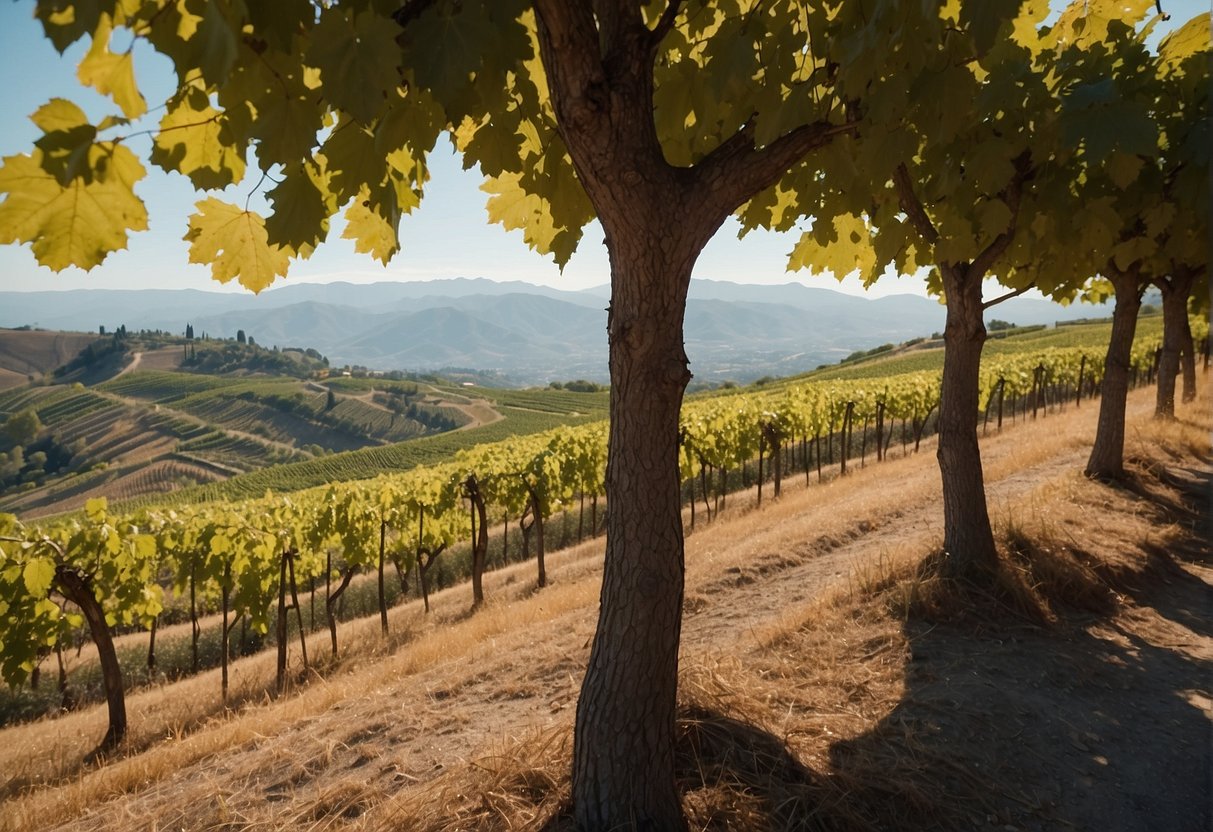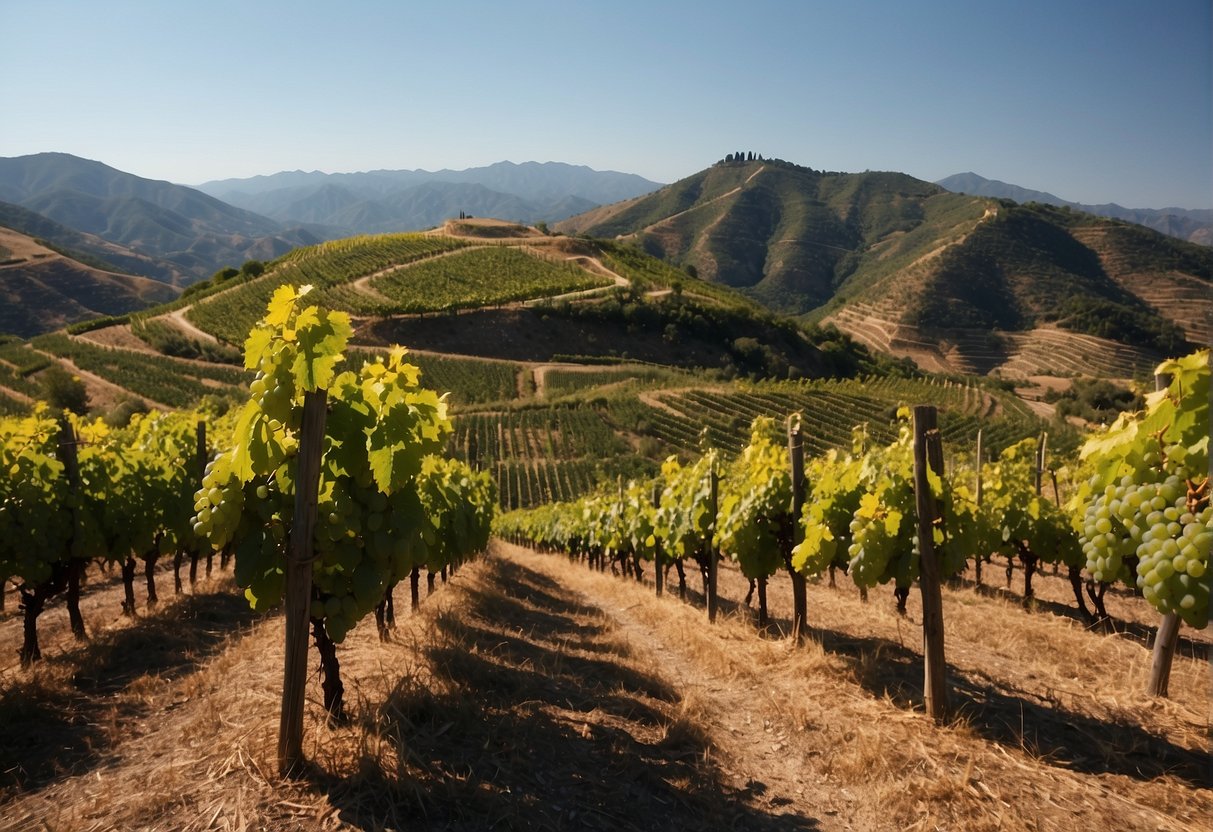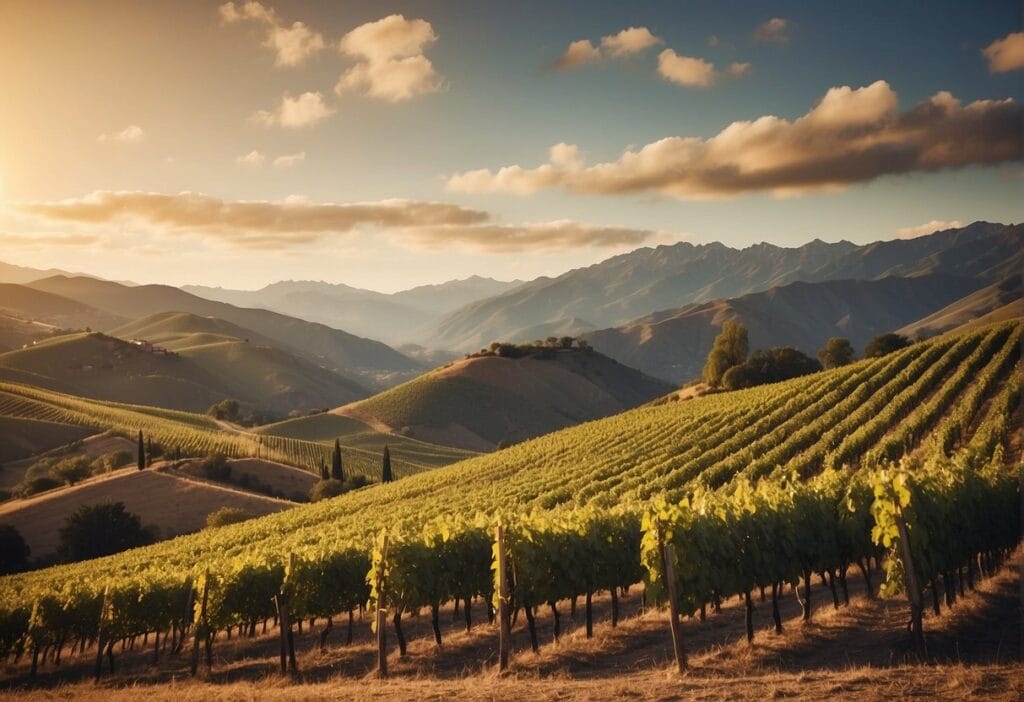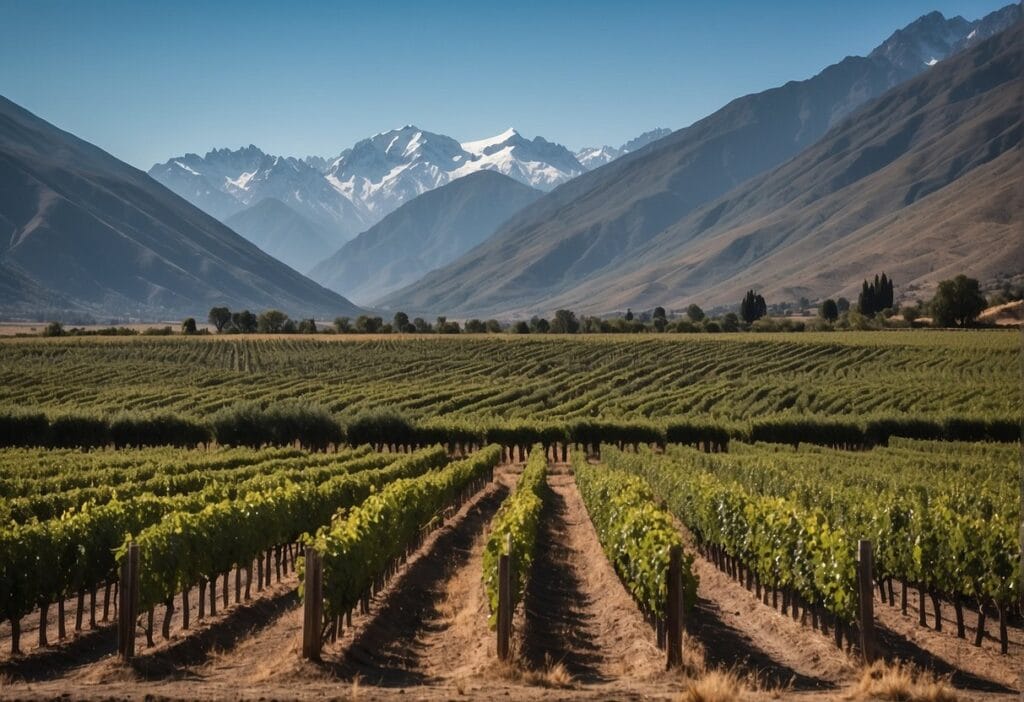Calabria, nestled in the southernmost part of Italy, is a wine region rich in history and tradition. Its unique position, forming the ‘toe’ of the Italian ‘boot,’ provides it with a distinctive geography, sandwiched between the Tyrrhenian and Ionian seas. The narrow Strait of Messina separates Calabria from Sicily, but despite this close proximity, Calabrian wines have developed a character all their own.

With a wine heritage dating back to the ancient Greeks, who once called this land Oenotria, or ‘land of wine,’ Calabria boasts a legacy of viticulture that contributes both culturally and economically to the area.
The Calabrian wine region is characterized by its varied terrain and climate, with rugged mountains giving way to sun-kissed coastal areas. Such diversity allows for a range of grape varieties and wine styles, particularly red wines that make up a significant portion of the area’s output.
Indigenous grapes like Gaglioppo dominate, producing wines with depth and character unique to this Italian enclave. Moreover, the region’s viticulturists and winemakers employ time-honored methods alongside modern techniques, to craft wines that are beginning to capture the attention of the international market.
Key Takeaways
- Calabria is a historically rich wine region located in the southern tip of Italy, surrounded by the Ionian and Tyrrhenian seas.
- The region’s diverse terrain allows for a variety of unique grape varieties and wine styles, primarily robust reds.
- Tradition and innovation blend in Calabrian winemaking, contributing to the growing recognition of its wines on the global stage.
History and Culture
Before you dive into a glass from the Calabria Wine Region, appreciate the deep historical roots and cultural influences that have shaped its unique winemaking tradition. From the impact of the Ancient Greeks to the significance of its identity as Oenotria, this place tells a fascinating story.
Influence of the Ancient Greeks
Calabria, once known to the Greeks as Oenotria, meaning “land of wine,” has a rich viticultural past. The Ancient Greeks were instrumental in developing the region’s wine culture, introducing sophisticated grape cultivation techniques.
Viticulture thrived under their guidance, and to this day, you can taste the remnants of their efforts in every bottle. For instance, Ciro wine, deeply rooted in local legend, is thought to have been enjoyed by the gods during the ancient Olympic games.
The Wine Legacy of Oenotria
The moniker Oenotria was no flight of fancy; this ancient name aptly described the oenological promise that the Calabria Wine Region continues to fulfill. The people from the land of vines have long celebrated the fruit of their labor with pride and joy.
Wines from this region, like those of the Cirò DOC, are steeped in tradition and carry forward the legacy of an area once cultivated by the skilled hands of the Oenotrians, and later by the Greeks. These traditional methods ensure that when you sip on Calabrian wines, you’re partaking in a millennia-old heritage.
Geography and Climate
Calabria, encompassed by the shimmering Tyrrhenian and Ionian Seas, offers a stunning backdrop for its vineyards, accentuated by the Mediterranean climate and mountainous terrains. This unique geography makes the region an intriguing study in the art of viticulture.
Regional Overview
Calabria, forming the ‘toe’ of Italy’s boot-shaped peninsula, is a land of contrasts with its extensive coastline along the Tyrrhenian Sea to the west and the Ionian Sea to the east.
You’ll observe the dramatic landscapes as it features rugged Apennine Mountains extending through the region, eventually tapering off near the stunning beaches and rocky cliffs, such as those by Capo Vaticano.
In the north, the region borders Basilicata and is flanked by the Pollino mountains, which host the highest peaks, while the Strait of Messina to the south serves as the natural separator between Calabria and the island of Sicily.
- Coastline: Tyrrhenian Sea (West), Ionian Sea (East)
- Mountain range: Apennine Mountains
- Notable Peaks: Pollino
- Separation: Strait of Messina divides Calabria and Sicily
Climate’s Impact on Viticulture
The climate in Calabria is quintessentially Mediterranean with hot, dry summers and mild, wet winters, ideal for grape growing.
Your awareness of this climate’s role is essential, as it affects the ripening process and the resulting flavor profile of the wine.
The mountainous topography provides a wealth of microclimates, which contribute to the diverse styles of wine that originate from the region.
Grapes grown nearer to the coast benefit from cooling sea breezes, particularly along the shores of both the Tyrrhenian and Ionian Seas, while elevation in the Apennines provides a more temperate escape from the heat, influencing the varietal expressions uniquely.
- Climate Type: Mediterranean
- Seasonal Influence: Hot summers, mild winters
- Viticultural Benefit: Ideal ripening conditions, diverse microclimates
Grape Varieties and Wine Styles

In the captivating Calabria Wine Region, you’ll discover a spectrum of wine styles shaped by a diverse array of indigenous grape varieties. You’re about to explore these grapes and the unique characteristics they bring to Calabrian wines.
Indigenous Grape Varieties
The heart of Calabrian viticulture beats with indigenous grape varieties that provide a distinct sense of place.
Gaglioppo, the king of Calabrian grapes, reigns supreme especially in the wine appellation of Cirò, lending its boldness to robust red wines known for their depth and structure.
On the white side, Greco Bianco creates elegant white wines that capture the essence of the sunny Mediterranean climate.
Other noteworthy red grape varieties include Magliocco and Nerello Mascalese, both contributing to the complexity and aromatic bouquets of the region’s reds.
You might also encounter Greco Nero and Nerello Cappuccio which further enrich the red wine portfolio.
Amongst white grapes, Mantonico and Guarnaccia stand out with their ability to produce both still and dessert styles that you’ll undoubtedly enjoy.
Not to be overlooked, Malvasia Bianca and Montonico bring fresh, floral notes to the region’s white wines, while Pecorello often adds a citrus tang.
Rosé wines, or Rosato, emerge primarily from red grape varieties, providing a refreshing option with a hint of Calabrian terroir.
Introduction to Calabrian Wines
Your journey into Calabrian wines will reveal a tapestry woven with plush red wines, refreshing whites, and delightful rosé sips.
The robust reds from Gaglioppo are characterized by their tannic nature and full-bodied profile, perfect for pairing with hearty meals.
In contrast, white wines from Greco Bianco reflect the coastal influences and mineral-rich soils of the region, resulting in crisp wines with a distinct minerality.
Calabria also embraces international grape varieties such as Chardonnay, Cabernet Sauvignon, and Ansonica, integrating them into its winemaking tradition to offer you a wider palette of wine styles.
These global citizens add diversity to the region’s offerings, sometimes blended with local grapes like Calabrese (also known as Nero d’Avola) and Magliocco, to create unique interpretations that still speak of their Calabrian roots.
Major Wine Regions and Denominations

Discover the rich tapestry of wine offerings in Calabria, featuring the historic Cirò DOC alongside an array of emerging areas eager to share their unique vintages.
Cirò: The Most Renowned DOC
Calabria’s wine reputation is largely anchored by Cirò, an area with a winemaking heritage dating back to ancient Greece.
The predominant wines here include Cirò Rosso featuring the native Gaglioppo grape known for its bold flavors, and Cirò Bianco with its crisp, floral characteristics.
The region stretches along the eastern coast near the Ionian Sea, producing wines that reflect the unique terroir of southern Italy.
Emerging Wine Areas
Aside from the well-established Cirò, Calabria’s other DOCs like Bivongi, Greco di Bianco, and Melissa are gaining recognition for their quality and variety.
Lamezia DOC, touching the shores of the Tyrrhenian Sea, Pollino DOC, and Terre di Cosenza DOC offer diverse wine styles that showcase the region’s wide-ranging microclimates and grape varieties.
Bivongi DOC and Melissa DOC, although less known, are producing wines that reflect the intricate wine heritage of regions like Isola di Capo Rizzuto and the broader landscape stretching to the Val di Neto.
Winemaking and Viticulture

In the Calabria wine region, you’ll discover a rich blend of traditional techniques and modern innovations. These approaches define the area’s unique viticulture and have a direct impact on the wine production.
Traditional Techniques
Calabria’s winemaking heritage is steeped in age-old practices that deeply respect the terroir. Vineyards spread across the rugged terrain, with some vines being centuries old and highly resistant to pests like phylloxera.
Traditional methods emphasize hand-harvesting and natural fermentation, a testament to the region’s dedication to preserving the authenticity of their wines. The Mediterranean climate plays a pivotal role by providing optimal conditions for grape cultivation.
- Vine training: Often performed by hand to protect the integrity of each vine.
- Harvesting: Manual picking ensures only the best grapes are selected for winemaking.
- Olive Oil: Agriculturally, olive cultivation stands alongside vineyards, often utilizing similar traditional care.
Modern Innovations
Despite the strong presence of tradition, Calabrian vintners are not strangers to modern innovations. In recent years, they’ve embraced new techniques that enhance efficiency without sacrificing the character of the wine.
- Irrigation systems: Strategically used to cope with the arid conditions.
- Pest management: Integrating environmentally sustainable practices.
- Barrel aging: Incorporating both new and old oak to provide complexity.
Economy and Cooperation

The wine region of Calabria is defined by its rich collaboration and the economic impact of its vineyards. You’ll find that the balance between tradition and economic growth lies in the local co-operatives and wineries.
Role of Co-operatives
In Calabria, co-operatives play a pivotal role in the wine industry, creating a network of shared resources that benefits all members. You’re part of this when you invest in a bottle of Calabrian wine, as many of these co-operatives are collective efforts of local growers aiming to improve their market presence and economic stability.
They work together to pool their resources, knowledge, and labor to enhance production and quality.
Economic Contribution of Vineyards
The vineyards dotting the Calabrian landscape aren’t just a treat for your eyes; they’re a driving force in the local economy. The cultivation of native grapes like Gaglioppo and the production of renowned wines underscore the region’s commitment to preserving its oenological heritage.
These operations aren’t simply about creating fine wines; they’re about fueling the economy through local and export markets. Despite Calabria producing considerably less wine than neighboring regions, every bottle you enjoy supports economic growth and international cooperation, aiming to put Calabria on the map as a bastion of quality winemaking.
Tourism and Gastronomy

Discovering Calabria through its wines and culinary delights means enjoying experiences that are both authentic and deeply rooted in tradition. From the rolling vineyards to the rich, local products, your journey through this southern Italian gem is a blend of cultural discovery and sensory pleasure.
Wine Tourism in Calabria
Lamezia Terme is not just a transportation hub; it’s a gateway to the wine culture of Calabria. Indulge in guided tastings at vineyards that showcase the region’s indigenous grape varieties, such as the robust Gaglioppo or the aromatic Guardavalle.
The wine routes don’t stop here; branching out to locales like Catanzaro and Reggio Calabria reveals a tapestry of wineries, many of which offer tours and tastings that illuminate the winemaking process from grape to glass.
For a touch of the unique, seek out the Moscato di Saracena, a noteworthy dessert wine with distinct floral aromas. The vineyards set in the picturesque landscapes, from the Tyrrhenian coast to the borders with Sicily and Basilicata, tell a story older than Italy itself, filled with tradition and a love for the craft.
Calabrian Cuisine Pairings
Calabrian cuisine is a journey through robust flavors and hearty dishes. The regional staples like the fiery ‘nduja sausage and the sharp pecorino cheese call for a wine that can match their intensity.
Enjoy a glass of full-bodied red next to a plate of pasta with ‘nduja or pair the locally produced olive oil with a crusty loaf of bread and a glass of crisp white wine from the coastal vineyards.
When seafood is on your menu in coastal towns like Tropea, embrace the delicate white wines that harmonize with the fresh catch of the day. If you’re venturing further inland, the simple, yet rich flavors of Calabrian cuisine, often with milk or cheeses as key ingredients, are elevated by the local reds.
Influential Wineries and Estates

The Calabria wine region is home to wineries that have shaped the local viticulture landscape. From historic family-run estates to innovative producers, these wineries offer unique contributions to Calabria’s wine legacy.
Notable Calabrian Wineries
- Statti: An embodiment of progress in the Calabria wine industry, Statti has blended traditional methods with modern techniques. They not only produce excellent wines but also fine olive oil and milk, which showcases their commitment to diversified agricultural practices.
- Le Moire: Small but impactful, Le Moire serves as a bridge, connecting the past and present of Calabria’s winemaking. With a philosophy rooted in tradition yet open to innovation, this winery has carved out a distinctive identity.
Family-Run Estates and Their Legacy
- Tenute Pacelli: Tenute Pacelli’s reputation for dedication and passion in winemaking has secured their position as guardians of Calabrian winemaking heritage. As a family-run estate, their story is woven into the broader narrative of Calabria’s viticulture.
- La Pizzuta del Principe: Holders of a rich winemaking philosophy, La Pizzuta del Principe has strengthened Calabria’s winemaking repertoire. Your palate can experience the result of their deep connection to the land through their refined wines.
Frequently Asked Questions

Here’s what you need to know about the renowned Calabria wine region—famed for its array of distinct wines, unique grape varieties, and the scenic vineyards nestled in the southern tip of Italy.
What types of red wines are most famous in the Calabria region?
Calabria is celebrated for its robust and flavorful red wines, particularly those made from the Gaglioppo grape. This variety often yields wines like Cirò Rosso, which is highly regarded for its deep, rich flavors.
Could you recommend some top-rated wines originating from Calabria?
For a taste of Calabria’s exquisite offerings, you might enjoy the Statti Gaglioppo, known for its elegance and complexity. Additionally, Librandi’s Cirò Rosso is highly praised and wonderfully represents the region’s winemaking tradition.
How does Calabria’s wine production compare to other Italian wine regions?
While Calabria may not produce the volume of wine found in regions like Tuscany or Piedmont, it offers a unique terroir. This results in distinctive wines that contribute a special variety to Italy’s prodigious wine portfolio.
Which grape varieties are indigenous to Calabria?
Indigenous grape varieties such as Gaglioppo, Greco Nero, and Magliocco thrive in Calabria. These native grapes are the backbone behind many of the region’s signature wines, embodying Calabria’s rich winemaking heritage.
Are there notable differences between Calabrian wines sold in Australia and those available in Italy?
The Calabrian wines you’ll find in Australia may differ in vintage selection and availability. However, Australian importers strive to maintain the authenticity and quality that you would experience in Italy.
What are some prominent wine brands or vineyards based in Calabria?
Famous estates such as Statti and Librandi are known not only for their fine wines but also their contributions to the enotourism of the region.
These vineyards offer an authentic Calabrian wine experience with their diverse and traditional wine selections.

